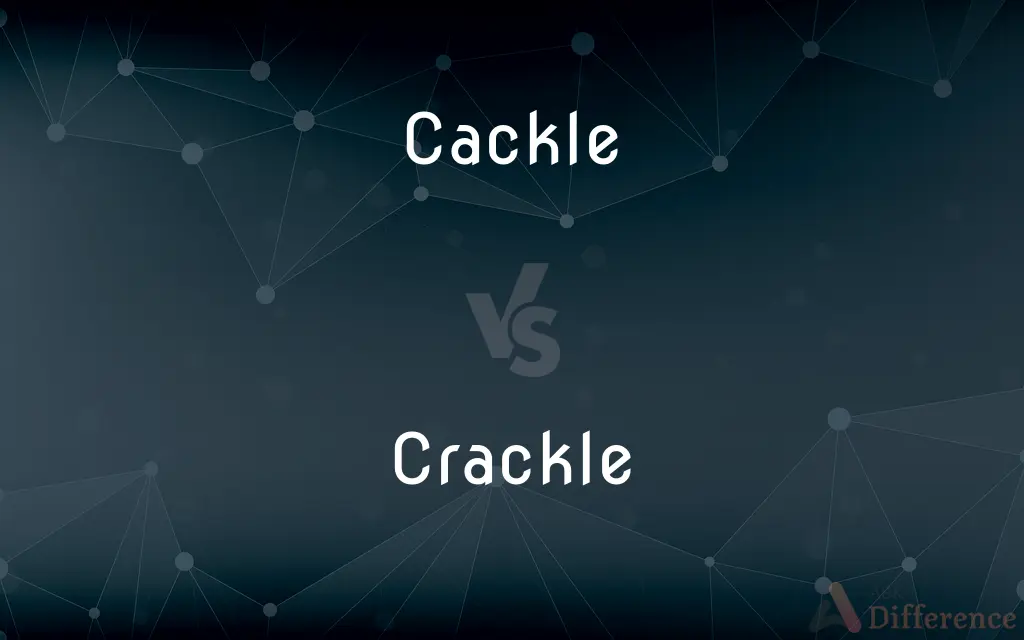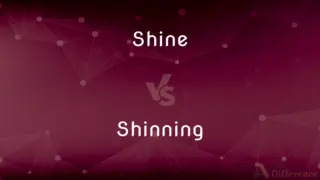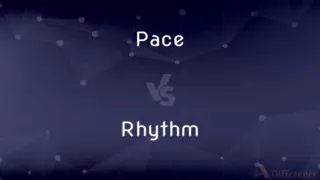Cackle vs. Crackle — What's the Difference?
By Urooj Arif & Maham Liaqat — Updated on April 1, 2024
Cackle refers to a loud, harsh laugh, while crackle denotes a series of short, sharp sounds.

Difference Between Cackle and Crackle
Table of Contents
ADVERTISEMENT
Key Differences
Cackle is often used to describe the sound of a loud, sharp laugh, typically one that might be considered unpleasant or harsh. This term can be associated with people or certain animals, like hens or witches in popular culture, where it conveys a sense of laughter that is raucous or shrill. On the other hand, crackle refers to a sound effect that consists of a series of quick, sharp noises. It's a term frequently used to describe the sound made by fire, dry leaves underfoot, or the static of a radio, suggesting something that is continuous but intermittent in nature.
The act of cackling is primarily a vocal expression, conveying amusement or joy in a manner that might be considered excessive or annoying by some. Crackle, however, is more about a physical sound that objects make, often related to heat, electricity, or dryness. This distinction highlights how cackle is more about human or animal sounds, while crackle is tied to inanimate objects or elements.
Cackle is expressive and can carry different connotations depending on the context, often used to imply a certain type of laughter that's either joyfully uninhibited or somewhat derisive. Crackle, by contrast, adds sensory detail to descriptions, evoking vivid imagery of gentle disturbances or the quiet activity of natural and mechanical processes.
While cackling can be seen as a form of communication or reaction, crackling does not convey messages but rather enhances the atmosphere or setting, providing a backdrop of sound that can influence the mood or setting of a scene. The emotional response elicited by a cackle can be quite different from the more neutral or even comforting response that crackle might evoke, such as the coziness associated with a crackling fire.
Both sounds are distinct in their associations and effects: cackle with human expression and social contexts, crackle with physical phenomena and environmental settings. These differences underscore the unique roles they play in language and description, one rooted in social interaction and the other in the sensory experience of the world around us.
ADVERTISEMENT
Comparison Chart
Definition
A loud, harsh laugh.
A series of short, sharp sounds.
Associated With
People and certain animals.
Fire, dry leaves, static.
Conveys
Amusement, joy, or derision.
The physical state of objects or elements (heat, dryness).
Use in Language
Descriptive of vocal expression.
Descriptive of ambient or environmental sounds.
Emotional Response
Varies from joy to annoyance.
Often neutral, can be comforting or indicative of activity.
Compare with Definitions
Cackle
Associated with certain animals, like hens.
The hen's cackle announced the arrival of a new egg.
Crackle
Associated with static or interference.
The radio emitted a soft crackle before finding the signal.
Cackle
Sometimes used pejoratively.
The constant cackle from the back of the class was distracting.
Crackle
Indicates the breaking of something brittle.
The crackle of the ice warned of the danger beneath.
Cackle
Reflects a specific quality of laughter.
His unique cackle made him stand out at the comedy club.
Crackle
The sound of fire burning.
The crackle of the campfire created a cozy atmosphere.
Cackle
A loud, harsh laugh.
The witch's cackle echoed through the dark forest.
Crackle
The noise made by dry leaves or twigs.
The crackle of leaves underfoot announced her approach.
Cackle
Expressive, often indicating joy or mockery.
Her cackle could be heard across the room, drawing everyone's attention.
Crackle
Often used to describe atmospheric sounds.
The crackle of the vinyl record added a warm, nostalgic feel to the music.
Cackle
To make the shrill cry characteristic of a hen after laying an egg.
Crackle
To make a succession of slight sharp snapping noises
A fire crackling in the wood stove.
Cackle
To laugh or talk in a shrill manner.
Crackle
To show liveliness, energy, or intensity
A book that crackles with humor.
Cackle
To utter in cackles
Cackled a sarcastic reply.
Crackle
To become covered with a network of fine cracks; craze.
Cackle
The act or sound of cackling.
Crackle
To crush (paper, for example) with sharp snapping sounds.
Cackle
Shrill laughter.
Crackle
To cause (china, for example) to become covered with a network of fine cracks.
Cackle
Foolish chatter.
Crackle
The act or sound of crackling.
Cackle
The cry of a hen or goose, especially when laying an egg.
Crackle
A network of fine cracks on the surface of glazed pottery, china, or glassware.
Cackle
A laugh resembling the cry of a hen or goose.
Crackle
Crackleware.
Cackle
Futile or excessively noisy talk.
Crackle
A prolonged, frequent cracking sound; a fizzing, popping sound.
Cackle
A group of hyenas.
Crackle
(pottery) A style of glaze giving the impression of many small cracks.
Cackle
(intransitive) To make a sharp, broken noise or cry, as a hen or goose does.
Crackle
(physics) The fifth derivative of the position vector with respect to time (after velocity, acceleration, jerk, and jounce), i.e. the rate of change of jounce.
Cackle
(intransitive) To laugh with a broken sound similar to a hen's cry.
The witch cackled evilly.
Crackle
Syn of crackling
Cackle
(intransitive) To talk in a silly manner; to prattle.
Crackle
(intransitive) To make a prolonged, frequent cracking sound which sounds like fizzing or popping.
A crackling fire
Cackle
To pretend to rattle (dice) in one's hand while gripping them so that they maintain their orientation.
Crackle
Misspelling of cackle
Cackle
To make a sharp, broken noise or cry, as a hen or goose does.
When every goose is cackling.
Crackle
To make slight cracks; to make small, sharp, sudden noises, rapidly or frequently repeated; to crepitate; as, burning thorns crackle.
The unknown ice that crackles underneath them.
Cackle
To laugh with a broken noise, like the cackling of a hen or a goose; to giggle.
Crackle
The noise of slight and frequent cracks or reports; a crackling.
The crackle of fireworks.
Cackle
To talk in a silly manner; to prattle.
Crackle
A kind of crackling sound or râle, heard in some abnormal states of the lungs; as, dry crackle; moist crackle.
Cackle
The sharp broken noise made by a goose or by a hen that has laid an egg.
By her cackle saved the state.
Crackle
A condition produced in certain porcelain, fine earthenware, or glass, in which the glaze or enamel appears to be cracked in all directions, making a sort of reticulated surface; as, Chinese crackle; Bohemian crackle.
Cackle
Idle talk; silly prattle.
There is a buzz and cackle all around regarding the sermon.
Crackle
The sharp sound of snapping noises
Cackle
The sound made by a hen after laying an egg
Crackle
Glazed china with a network of fine cracks on the surface
Cackle
Noisy talk
Crackle
Make a crackling sound;
My Rice Crispies crackled in the bowl
Cackle
A loud laugh suggestive of a hen's cackle
Crackle
Make crunching noises;
His shoes were crunching on the gravel
Cackle
Talk or utter in a cackling manner;
The women cackled when they saw the movie star step out of the limousine
Crackle
To become, or to cause to become, covered with a network of small cracks;
The blazing sun crackled the desert sand
Cackle
Squawk shrilly and loudly, characteristic of hens
Crackle
Having the surface decorated with a network of fine cracks, as in crackleware;
A crackle glaze
Cackle
Emit a loud, unpleasant kind of laughing
Common Curiosities
Is crackle always associated with fire?
Not always; crackle can describe any short, sharp sounds, including those made by dry leaves, static, or breaking objects.
What kind of mood can crackle evoke?
Crackle can evoke various moods, from the comfort of a crackling fire to the tension of crackling static on a radio.
What primarily distinguishes a cackle from a crackle?
The distinction lies in cackle being a type of laughter and crackle being a type of sound made by objects or elements.
Can animals cackle?
Yes, certain animals, like hens, are described as cackling, especially when making loud, sharp calls.
Can cackle have a positive connotation?
Yes, cackle can be positive, indicating uninhibited joy or laughter, though it often carries a harsh or loud aspect.
Can the sound of a cackle be comforting?
Depending on the context and the listener's perception, a cackle might be comforting if it signals joy or camaraderie.
Is cackle used only in negative contexts?
No, while it can be used pejoratively, cackle can also simply describe a loud or distinctive laugh, without negative judgment.
How is crackle used in storytelling?
Crackle is often used to add sensory detail, enhancing the ambiance or setting of a scene with its descriptive sound.
Do all cultures interpret cackle and crackle in the same way?
Interpretations can vary with cultural context, especially in how sounds are perceived and what emotions they evoke.
Can a voice crackle?
Yes, describing a voice as crackling typically refers to a rough, breaking quality, often due to emotion or age, differing from the sharp sound associated with physical objects.
Share Your Discovery

Previous Comparison
Shine vs. Shinning
Next Comparison
Pace vs. RhythmAuthor Spotlight
Written by
Urooj ArifUrooj is a skilled content writer at Ask Difference, known for her exceptional ability to simplify complex topics into engaging and informative content. With a passion for research and a flair for clear, concise writing, she consistently delivers articles that resonate with our diverse audience.
Co-written by
Maham Liaqat













































